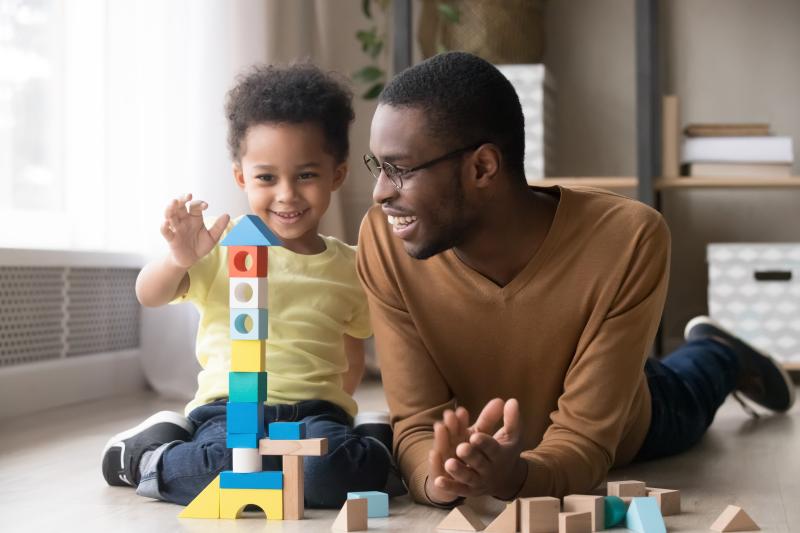
I think most new parents have very little or almost no knowledge of key factors in child’s cognitive and mental health development when their child is born.
We all spend years in schools, colleges and universities learning academics, learning things like history, geography, communications, . . . but the schools do not teach us a bit on the important things like how to interact, engage and play with our children so they grow up being in good mental health.
One of the most important thing that most people do not know is that the first five years of a child’s life is the most important period for child’s brain cognitive development.
This first five years can vary in some children and there are many children who continue developing brain connections in the areas of emotional intelligence passing the age of five.
Children’s brain is like a sponge, absorbing and copying what we do and how we interact with them. Children’s positive and negative experiences and interactions with their caregivers are recorded in their consciousness and those recorded experiences will influence the children throughout their adulthood.
The reason I emphasize the importance of positive engagement and positive interactions with our children, especially within the children’s first seven years is because if the children go through negative interactions and experiences, they absorb and record the negative experiences into their consciousness, kind of like incorrectly built brain connections, and it will be difficult to reconstruct the already built connections. Those negative or incorrectly build connections will show up later in life as negative traits and so what goes on in children’s life within the first seven years will affect the child throughout his/her lifetime.
For example, if a child is raised by parents who are constantly hostile to each other, especially when the hostility turns into aggression between the parents in front of the child, not only the child may learn the hostile aggressive behavior from his/her parents, the child may develop lasting feeling of insecurity, worries, anxiety as the result of seeing his/her parents being destructive to each other.
Just making sure that our children do not go through negative experiences in life is not enough; we will need to coach and train our children emotional intelligence traits such as empathy, kindness, flexible thinking, self regulation, impulse control, independence, problem solving, honesty, conformity, understanding other people’s boundaries, and more..
For example, if you always pick up after your kid and do not teach your kid to pick up after himself/herself, he/she will grow up with this habit of expecting others to pick up after him/her.
It is very important to teach our children empathy at young age. You can teach your kids empathy by playing the empathy game: for example, you make a sad face and your kid needs to guess how you’re feeling, now its your kid’s turn to make a face and you guess his/her emotion. That is a good start to teach our kids empathy.
I also have tried to teach my kid empathy by praying with him every night before going to bed, we both start praying together about well-being of other family members and friends, we pray: “God please help mom to be a very happy mom and feeling good”, “God please help my nephews and nieces, …. to be very happy and feeling good”, then we pray for our friends and at last we pray for ourselves.
I believe when we pray and wish others to be healthy and happy, we build empathy in our children, we also teach our children altruism.
The other thing that I have tried to teach my kid is self regulation and impulse control.
I have come up with impulse control games. For example, I buy my kid two games that he really likes, I give him one game, but not the other, (I tell him that the other game is a surprise); I tell him if he waits and not open his game right away, but first eats his lunch or clean up his room (teaching delayed gratification), then he can open his favorite game and he will get his surprise game at the same time.
Then more importantly, I praise him for waiting - this is to remind and encourage the positive traits, in this case, self regulation and impulse control.
So you teach self regulation and impulse control by teaching your kid to wait before getting his favorite thing and you keep increasing the waiting time.
It is important to know that children learn and connect through play with their parents or caregivers, that is why I use games to teach my kid emotional intelligence such as empathy, impulse control, self regulation, etc..
One thing you can do that will help your child to listen, learn and be a happier kid is to spend special time with your kid, one parent at the time, get on your child level and play as if you’re another kid, your child’s age and enjoy playing with him/her. Make sure to keep praising your child when he/she exhibits positive traits.
It may seem straight-forward, but even playing with your child is a skill that needs to be learned. Things like reflecting, praising your child, and letting your child lead and enjoy playing with your child goes a long way. You can read in more detail on how to play with your child in my article here.
It is very important for parents to know and apply these important parenting skills so the children learn emotional intelligence traits at young age because it would be very hard for a child to relearn a trait once the child had learned the negative trait.
Essential Parenting Skills for Parents of Young Children